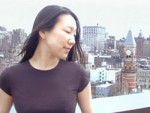Column Name
Title
Julia Cho is a complex writer—in the best way possible.
Body
She hears her plays the way a composer must hear his music—the rhythms, the pauses, the harmony. The plays she writes “try to approach poetry,” she says. Take for instance her most recent play, The Piano Teacher, which opened in November at the Vineyard Theater. Charles Isherwood of The New York Times called it “deftly wrought.” It is one of those plays that lulls you ... and then jolts with an enormous impact because it goes against the automatic conclusion you draw when things start turning bad.
Cho has always defied expectations—not surprising for someone whose first play in the eighth grade was about people stranded in a bomb shelter. Her initial theater exposure consisted of Andrew Lloyd Weber musicals and bad productions of Shakespeare. Then when she was 14, she saw Six Degrees of Separation at Lincoln Center. She says the seeds of her desire to be a playwright were planted that day.
She started writing in college by exploring poetry and prose. But Cho feels she wasn't very good at either. Then, in her last year at Amherst, she started taking playwriting classes with Constance Congdon, who opened up “a whole new world” for Cho. She went on to do an M.F.A. at New York University, followed by a residency in Juilliard’s Playwrights program from 2001 to 2003.
“I loved my time at Juilliard,” said Cho, 32, in a recent interview. “I appreciated how Marsha [Norman] and Chris [Durang] treated us as colleagues and not as students; I felt they gave us a great deal of respect and freedom. Under their guidance, I was able to be productive in my time there and I particularly learned a lot from a workshop I did with Brian Mertes and the Group 34 actors … learning how to let go, to collaborate and have faith in your collaborators. These lessons have stuck with me and fundamentally changed me as a theater artist.”
Complexity and Ms. Cho are old friends. Born in 1975 to Korean parents on the West Coast, Cho identifies herself as American. “It was a very porous household. For me to say that being of Korean origin influences my work is the same as saying being a woman or being American influences my writing.”
Labels, she stresses, are “the way we make the world convenient.” And convenience seems to be the last thing Cho is interested in. “I’m drawn to the ‘what ifs’. Sometimes an image sticks in the back of my head and there’s a spot thatbothers me … that’s where a play comes from. Usually a small memory or an event. And the what ifs.”
The what ifs? Cho elaborates. When things happen a certain way, she wonders what if something else had happened—and her imagination leads her to places of great fear and great hope. Thus begins the process of transformation.
A good example is The Piano Teacher. “An old piano teacher of mine got in touch with me years after I’d stopped taking classes,” she says. “At the time I didn’t understand why she’d called. However, later, I realized that the teacher wanted to know if I had turned out well. I found this to be a very human gesture. And from that phone call a seed was planted and the process of alchemy started which led to the play.”
Cho refers to the work of her theater heroes (Caryl Churchill, Chekhov, Chay Yew, and Sarah Ruhl) as “astonishing, humbling,” and having “profound empathy and intelligence.”
The same could be said of Cho’s own work. But, asked if she is happy with where she’s at, she replies, “I’m grateful to be where I am. I know how difficult it is to get produced, and I feel enormously lucky to have worked at such amazing theaters. But I think there is also always a kind of dissatisfaction with my own writing. I want to be better—not just as a writer, but as a person. I want to know more, feel more, imagine more. … I continuously feel like a beginner. With each new play I sit down and have no idea how to write it. It always feels like there is so much to learn; it's endless. It's the work of a lifetime.
Cho's parents are supportive and proud of her "life's work." Both were "initially miffed" when she left English grad school to write plays, but Cho laughingly says that she believes it is now her mother's goal to attend every single opening of her plays.
Cho muses that she doesn’t know what her next play is going to be. She does know that she’d like to try something she hasn’t done before—fitting for a playwright who resists easy classification, thereby making it easier for the rest of us to allow more nuance into our lives.





